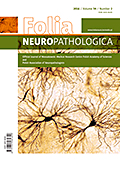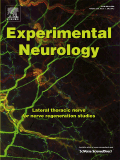
FOLIA NEUROPATHOLOGICA
Scope & Guideline
Exploring the intersection of neurology and pathology.
Introduction
Aims and Scopes
- Neuropathology and Neurodegenerative Diseases:
The journal emphasizes the study of neuropathological changes associated with various neurodegenerative diseases, including Alzheimer's disease, Parkinson's disease, and gliomas, facilitating a deeper understanding of their mechanisms. - Molecular Mechanisms and Biomarkers:
A core area of focus is the exploration of molecular pathways and potential biomarkers that could aid in the diagnosis and prognosis of neurological conditions, including the role of microRNAs and inflammatory markers. - Neuroinflammation and Neuroprotection:
Research exploring the mechanisms of neuroinflammation and strategies for neuroprotection is prevalent, highlighting therapeutic approaches to mitigate neuronal damage. - Clinical Neurology and Neuroimaging:
The journal publishes studies that integrate clinical findings with neuroimaging techniques, aiming to improve diagnostic accuracy and treatment outcomes for neurological disorders. - Translational Research and Therapeutics:
FOLIA NEUROPATHOLOGICA showcases translational research that bridges laboratory findings with clinical application, particularly in developing novel therapeutic strategies for brain injuries and diseases.
Trending and Emerging
- Role of Non-Coding RNAs in Neurology:
There is a growing emphasis on the role of long non-coding RNAs and microRNAs in the regulation of neurological disorders, indicating their potential as biomarkers and therapeutic targets. - Neuroinflammation as a Therapeutic Target:
Increasing attention is being paid to the mechanisms of neuroinflammation and its modulation, with studies exploring various pathways for potential therapeutic interventions. - Neuroprotective Strategies in Stroke and Injury:
Research focusing on neuroprotective strategies, particularly in the context of ischemic stroke and traumatic brain injury, is becoming more prominent, reflecting a need for effective treatments in acute neurological conditions. - Integrative Approaches in Neurological Disorders:
There is a trend towards integrative approaches combining traditional and modern therapies, including the use of nanotechnology and stem cell therapies, to enhance treatment efficacy. - Impact of COVID-19 on Neurological Health:
The journal has seen an increase in studies investigating the neurological implications of COVID-19, highlighting the need to understand the long-term effects of the pandemic on brain health.
Declining or Waning
- Traditional Neuropathology Techniques:
There has been a noticeable decrease in studies solely dedicated to traditional histopathological techniques, as the field increasingly values molecular and genetic analyses over conventional approaches. - Epidemiological Studies:
Research focusing on the epidemiology of neurological disorders seems to be waning, possibly due to a shift towards more mechanistic and intervention-focused studies. - Pharmacological Studies on Established Drugs:
The frequency of papers centered on the effects of well-established pharmacological treatments has decreased, indicating a pivot towards novel therapeutic agents and innovative treatment modalities.
Similar Journals

Alzheimers Research & Therapy
Innovating solutions for neurodegenerative challenges.Alzheimer's Research & Therapy is a leading peer-reviewed journal published by BMC, dedicated to advancing our understanding of Alzheimer's disease and other neurodegenerative disorders. As an Open Access journal since 2009, it ensures that vital research findings are freely accessible to the global community, facilitating collaboration and innovation in the field. The journal's commitment to quality is evident in its impressive impact factor and its prestigious ranking in the Q1 quartile across multiple categories including Cognitive Neuroscience and Neurology. With a Scopus rank placing it in the top tier of both Neuroscience and Neurology disciplines, Alzheimer's Research & Therapy serves as a crucial platform for researchers, clinicians, and students who seek to contribute to the fight against Alzheimer's and related disorders. The journal covers a wide range of topics and actively encourages submissions that explore therapeutic strategies and innovative research methodologies, enriching the scientific dialogue in this vital area of health.

JOURNAL OF NEUROPATHOLOGY AND EXPERIMENTAL NEUROLOGY
Unveiling Insights in Neurological DisordersJOURNAL OF NEUROPATHOLOGY AND EXPERIMENTAL NEUROLOGY, published by Oxford University Press Inc, stands as a pivotal resource for advancing research and knowledge in the domains of neuropathology and experimental neurology. Established in 1942, this esteemed journal has expanded its influence, as evidenced by its Q1 rankings in both Neurology (clinical) and Pathology and Forensic Medicine, along with its strong placement in Cellular and Molecular Neuroscience. With an emphasis on innovative research and clinical practices, it caters to a diverse audience, including researchers and clinicians dedicated to understanding neurological disorders through a multidisciplinary lens. While not open access, this journal provides access to cutting-edge studies that are pivotal in shaping the future of medical science and pathology. Researchers benefit from its rigorous peer-review process, ensuring the publication of high-caliber work that meets the evolving demands of the field.

BRAIN PATHOLOGY
Unveiling Innovations in Brain PathologyBRAIN PATHOLOGY, published by WILEY, is a leading journal in the fields of neurology, neuroscience, and pathology, recognized for its rigorous peer-review process and high-impact research contributions. With an impressive impact factor and consistently ranked in the Q1 quartile across multiple categories, BRAIN PATHOLOGY maintains a prominent status, with a Scopus ranking placing it among the top 10% of journals in its fields. Since its inception in 1990, the journal has served as a crucial platform for researchers and clinicians alike, disseminating groundbreaking findings that advance our understanding of brain diseases and injuries. Through its dedication to publishing high-quality, innovative research, BRAIN PATHOLOGY plays a vital role in shaping the future of brain pathology research. While it does not currently offer open access, articles can be accessed through institutional subscriptions. Researchers, professionals, and students are encouraged to contribute to and engage with this esteemed publication to foster knowledge and collaboration within this dynamic field.

Alzheimers & Dementia
Exploring cutting-edge advancements in dementia care.Alzheimers & Dementia is a premier journal published by WILEY that focuses on the latest advancements in understanding, diagnosing, and treating Alzheimer's disease and other dementias. With an ISSN of 1552-5260 and an E-ISSN of 1552-5279, this influential journal boasts a commendable impact factor and ranks in the Q1 category across several disciplines, including *Cellular and Molecular Neuroscience*, *Geriatrics and Gerontology*, and *Neurology (Clinical)*. By publishing cutting-edge research, systematic reviews, and innovative clinical trials, Alzheimers & Dementia aims to bridge the gap between basic neuroscience and clinical practice, offering valuable insights into the etiology, epidemiology, and management of dementia-related disorders. The journal is hosted in the United States and operates under a balanced access model, providing essential resources for researchers, healthcare professionals, and students dedicated to tackling the challenges posed by these neurodegenerative diseases. Available online, it plays a pivotal role in shaping current and future research directions in the vibrant field of dementia studies.

ACTA NEUROPATHOLOGICA
Innovating Research in Cellular and Molecular NeuroscienceACTA NEUROPATHOLOGICA, published by Springer, is a leading journal in the fields of cellular and molecular neuroscience, clinical neurology, and pathology, recognized for its exceptional quality and impactful research. With an impressive impact factor and currently ranked in the Q1 tier across multiple categories in 2023, this journal serves as a premier platform for the dissemination of groundbreaking findings in neuropathology. The journal's robust Scopus rankings highlight its influence, standing at #2 in Pathology and Forensic Medicine and #5 in Clinical Neurology. Since its inception in 1961, ACTA NEUROPATHOLOGICA has provided crucial insights into neurological diseases and disorders, contributing significantly to the advancement of medical science. Aimed at researchers, practitioners, and students alike, this journal fosters a deeper understanding of neurological conditions and encourages innovative approaches within the field. It is essential reading for anyone dedicated to unraveling the complexities of the nervous system.

EUROPEAN NEUROLOGY
Exploring Neurological Innovations Since 1897European Neurology, published by KARGER, is a distinguished journal in the field of neurology, catering to both clinical and neuroscience specialties. Since its inception in 1897 and continuing through 2024, the journal has been a vital platform for disseminating significant research findings and insights in neurology. With an ISSN of 0014-3022 and E-ISSN of 1421-9913, it ranks in the Q3 quartile in both clinical neurology and general neurology categories, reflecting its commitment to scholarly excellence while holding the 175th rank in clinical medicine and the 93rd in neuroscience, according to Scopus metrics. European Neurology facilitates a deeper understanding of neurological disorders and treatments, appealing to a diverse readership that includes researchers, clinicians, and students alike. Despite not currently offering open access, the journal’s rigorous peer-review process ensures that only high-quality research reaches its audience, making it an essential resource for those looking to stay informed in the rapidly evolving field of neurology.

Annals of Clinical and Translational Neurology
Fostering Collaboration in Neurological ScienceAnnals of Clinical and Translational Neurology is a premier journal published by WILEY, focusing on the fields of neurology and neuroscience. Since its inception in 2014, it has established itself as an Open Access platform, providing unrestricted access to cutting-edge research to promote scientific collaboration and innovation. With an impressive Impact Factor residing in the top quartile (Q1) for both clinical neurology and miscellaneous neuroscience in 2023, this journal ranks #52 out of 400 in the Neurology category and #22 out of 113 in General Neuroscience, indicating its significant contribution to the field. The journal welcomes submissions that address emerging trends and challenges in translational neurology, aiming to bridge the gap between laboratory research and clinical practice. By disseminating high-quality research and fostering a community of scholars, Annals of Clinical and Translational Neurology plays a vital role in advancing our understanding of neurological disorders and improving patient care worldwide.

EXPERIMENTAL NEUROLOGY
Connecting Researchers to the Pulse of Neuroscience.EXPERIMENTAL NEUROLOGY is a premier academic journal published by Academic Press Inc, Elsevier Science, focusing on advancements in the fields of Developmental Neuroscience and Neurology. With an impressive Impact Factor and ranked in the Q1 quartile of both categories—positioning it among the top-tier journals—this publication has established itself as a vital resource for researchers, clinicians, and students alike. Since its inception in 1959, it has fostered the dissemination of cutting-edge research and innovative approaches to understanding neurological function and related disorders. While EXPERIMENTAL NEUROLOGY currently operates under a subscription access model, its rich archives and ongoing contributions to the field continue to inspire and inform the next generation of neurobiologists. The journal also boasts a high ranking in Scopus, placing fourth in Developmental Neuroscience and twentieth in Neurology, indicating its robust influence and scholarly significance. For those committed to advancing knowledge in these critical areas, EXPERIMENTAL NEUROLOGY is an indispensable platform for inquiry and discovery.

CURRENT OPINION IN NEUROLOGY
Exploring the Frontiers of Neurology.CURRENT OPINION IN NEUROLOGY is a premier academic journal dedicated to providing insightful overviews and critical analyses across all areas of neurology and clinical neurology. Published by Lippincott Williams & Wilkins, this esteemed journal boasts an impressive impact factor, highlighting its influence and relevance in the field—positioning it in the Q1 category for both neurology and clinical neurology as of 2023. With its comprehensive coverage, the journal serves as a vital resource for researchers, healthcare professionals, and students aiming to stay abreast of the latest developments, trends, and breakthroughs in neurological science and practice. Though not open access, articles are available via institutional subscriptions or individual purchase, ensuring that vital research remains accessible to a wide audience. Covering research from its inception in 1993 to ongoing studies in 2024, CURRENT OPINION IN NEUROLOGY stands out as an essential platform for disseminating knowledge and fostering dialogue within the dynamic and evolving landscape of neurology.

JOURNAL OF MOLECULAR NEUROSCIENCE
Enhancing Knowledge in the Dynamic Field of NeuroscienceJournal of Molecular Neuroscience, published by SpringerNature, is a critical resource for researchers and professionals in the dynamic field of neuroscience. With ISSN 0895-8696 and E-ISSN 1559-1166, this journal has established itself as a key player since its inception in 1989, covering a range of topics within Cellular and Molecular Neuroscience and Medicine (miscellaneous). Its impressive rankings, including being placed in the Q2 quartile for Medicine and Q3 for Cellular and Molecular Neuroscience, underscore its scholarly impact, featuring innovative research that informs and advances our understanding of neural processes. The journal does not currently operate under an open-access model, providing rich, peer-reviewed content geared towards academics and professionals seeking comprehensive analyses and breakthroughs in molecular neurobiology. With a publication window extending to 2024, the Journal of Molecular Neuroscience remains dedicated to enhancing the scientific community's knowledge landscape, making it an essential reference for those passionate about unraveling the complexities of the nervous system.